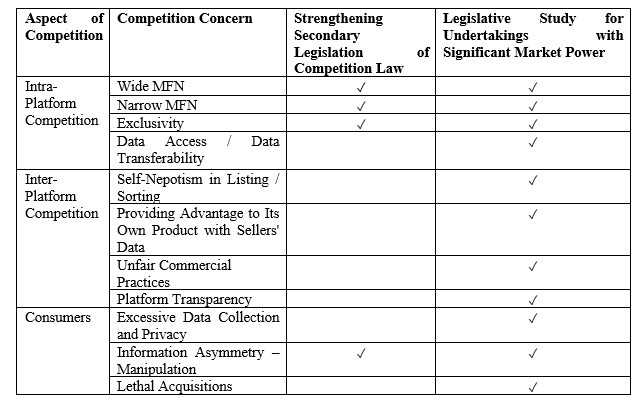PUBLICATIONS
Review of the Final Report of the Sector Inquiry Regarding the E-Marketplace Platforms

Introduction
The rapid change in internet technologies in recent years has reshaped digital markets and consumer habits, and it has become inevitable for competition law to keep up with this change.
In recent years, with the digitalization of commerce, competition concerns in the markets have started to change. Due to the increase in online sales volumes and the growth of e-commerce platforms, in particular, the Competition Board started a sector inquiry regarding the e-commerce platforms on 11 June 2020 in order to examine and find solutions to potential competition concerns related to e- commerce platforms. Accordingly, the Turkish Competition Authority published the industry preliminary report (“Preliminary Report”) regarding e-commerce platforms on May 7, 2021, revealing its preliminary findings and first solution proposals. After that, the final report (“Final Report”) regarding the sector review on e-commerce platforms was published on 14 April 2022.
In this article, firstly, the competition concerns regarding e-marketplaces brought to the agenda by the Competition Authority and the solution proposals mentioned in the Final Report will be discussed:
1. Key Competition Concerns Regarding the E-Marketplaces
As in the Preliminary Report, the Turkish Competition Authority has examined the main competition problems arising from the behavior of e-marketplaces under the headings of;
- Inter-platform competition,
- Intra-platform competition, and
- Concerns regarding consumers.
1.1. Inter-Platform Competition Concerns
In the context of inter-platform competition, it is stated that e-marketplaces will remain open to improvement to the extent that they feel competitive pressure on them, and accordingly, competition should be a necessity, not an option. In this direction, the main problems in terms of cross-platform competition are; (i) the most favored nation (“MFN”) (ii) exclusivity, and (iii) limiting multiple access.
In the Final Report, it is stated that as a result of the implementation of the wide MFN clauses by the gatekeeper undertakings, competition in the market would decrease, price rigidity would occur, and growth would be hindered by the decrease in market entry.
It has also been stated that the exclusivity clauses imposed on the sellers by the undertakings qualified as gatekeepers also have a positive effect on competition but may cause further concentration of the markets where there is already concentration. The Turkish Competition Authority also underlined in the Final Report that platform exclusivity principles should be regulated by secondary legislation.
In terms of limiting multiple access, it is understood that platforms generally do not prevent multiple access but make the transition to another platform financially and technically difficult. It has been determined that this method also makes it difficult and prevents consumers and/or third-party sellers from transfer their data on the platform to alternative platforms.
1.2. Intra-Platform Competition Concerns
The main concern of the Final Report regarding intra-platform competition emerges as “self-nepotism” (kendini kayırma) on the axis of discrimination. Accordingly, in hybrid marketplaces, there may be practices such as the platform prioritizing its own products rather than the products of third-party sellers, providing unfair advantages in lists and algorithms, or providing more advantageous circumstances for the products of third-party sellers using their own services (logistics, shipping, payment methods, etc.) compared to other sellers.
It is envisaged that if the above-mentioned behaviors occur with the encouragement and coercion of the platform, it will harm the competition within the platform. In response to this, in the Final Report, it was concluded that there is no aspect that harms competition in increasing the visibility of high-rated or more preferred sellers without any intervention of the platform.
Another intra-platform competition concern is unfair commercial practices. Unfair commercial practices consist of two main headings: (i) excessive pricing and (ii) unfair contractual terms. Accordingly, it is stated that platforms holding asymmetric market power have the risk of unilaterally determining and dictating commercial terms against third-party sellers. It is stated that sellers who are exposed to such unfair commercial practices may face commercial risks.
1.3. Competition Concerns Regarding Consumers
According to the Final Report, there are competition concerns for e-marketplace consumers based on (i) price, (ii) consumer addiction and loyalty practices, (iii) data, and (iv) innovation. Accordingly, excessive collection of consumer data and privacy breaches, information asymmetry, and unfair commercial terms imposed on third-party sellers are among the concerns regarding the exploitative practices of e-commerce platforms.
2. Final Policy Recommendations for Competition Concerns
Based on the competition concerns described above, three solutions were proposed in the Final Report:
- Implementation of a legal regulation in which the marketplace(s) that have significant market power in accessing consumers in the market and the behaviors that these undertakings are obliged to comply with and/or avoid will be determined as ex-ante,
- Implementing a “Platform Code of Conduct” based on “objectivity”, “transparency”, “preciseness” and “predictability” for the asymmetric power that dominates the market,
- Revising and strengthening the secondary legislation, taking into account the findings in the Preliminary Report.
In this context, the competition concerns in the Preliminary Report and the prominent ones in the Final Report, and the solution recommendations for the concerns about the consumers and the future of the market have been reviewed, and the final policy recommendations created by the evaluations are as follows:
1. Legislative Study for Undertakings Qualified as Gatekeeper
In accordance with the Final Report, some undertakings will be appointed as gatekeepers and additional obligations will be imposed on them. In this direction, the gatekeeper undertakings basically:
- should not impose contractual or de facto wide MFN terms on its sellers.
- should not act to prevent or restrict its sellers from communicating with the relevant public authorities regarding the problems they have with the marketplace.
- should refrain from using confidential data acquired through the activities of sellers in its own products that compete with the products of these sellers.
- should not provide an advantage to the products of its own or group companies in the rankings on its platform.
- should provide its sellers with free, effective, quality, and real-time access to performance tools so that they can monitor the profitability of their sales on the platform.
- should not create a technical or behavioral obstacle to the transfer of the data that its sellers or consumers provide to the marketplace to other platforms.
- should provide its sellers or third parties authorized by the sellers with free, effective, quality, and real-time access to the data provided by the seller to the marketplace and the data generated from this data.
- should notify the Competition Board of all the acquisitions, regardless of the notification thresholds specified in the – Communiqué No. 2010/4 on Mergers and Acquisitions Calling for the Authorization of the Competition Board.
Additionally, it is aimed to impose obligations to prevent the undertakings qualified as gatekeepers from applying to the MFN clauses and exclusivity practices.
It is also aimed that the transactions carried out by undertakings with significant market power in digital markets and the acquisition of newly established or developing enterprises will be subject to the supervision of the Turkish Competition Authority to a large extent and to prevent the lethal acquisition of the aforementioned undertakings.
2. “Platform Code of Conduct” Regulation
As explained above, there is a concern with e-marketplaces that sellers will be exposed to unfair commercial terms inter-and intra-platform. In the Final Report, it is recommended to define a “Platform Code of Conduct” in order to prevent this situation and ensure effective competition.
The Final Report highlights that the Platform Code of Conduct recommendation should be implemented more broadly, not just to the dominant e-marketplace platforms. As a matter of fact, it is underlined that unfair commercial terms may arise not only from the dominant position but also from the loyalty of the sellers. Considering the “dominance” threshold of Law No. 4054, it was considered appropriate to implement the Platform Code of Conduct recommendation by the relevant Ministries, and it was also stated that the Ministry of Commerce was carrying out a legislative study on this issue.
It is considered that it would be appropriate for the Platform Code of Conduct to include the following general terms:
- The terms of the contract should be written in a clear and understandable language and easily accessible to the sellers at every stage.
- In which cases the seller’s account will be suspended or what kind of restrictions will be applied when, under what conditions, and how should be explained in the terms and conditions of the contract, along with the justifications.
- The sellers should be informed about the planned changes in the contract conditions in advance, and the seller must have the right to terminate the contract for just cause due to the relevant change.
- The terms of the contract should not be changed retrospectively.
- In case of suspending or termination of relations with the seller, the notification should be placed 30 days in advance and with the reasons.
- The criteria that the marketplace considers in listing/sorting and the importance of these criteria should be explained to the sellers within the contract and terms.
- The terms and conditions for the marketplace to provide ancillary services such as shipping should be clearly stated in the terms and conditions of the contract.
- The general fee schedule regarding the prices and fees that the marketplace charges from the sellers should be transparently accessible to the sellers. The situation and conditions under which these fees will differ in terms of the sellers should also be explained in the terms and conditions of the relevant contract.
- Marketplaces should provide consumers and sellers with access to the data they provide to the marketplace.
- Marketplaces should establish an internal unit for seller complaints that can be easily accessed by sellers, offering free and reasonable timely resolution.
3. Strengthening Secondary Legislation
The rapid concentration trend in digital markets, including e-marketplace platforms, provides incumbent undertakings a market power and position that is difficult to capture by other actual or potential competitors. Accordingly, there is a requirement for a more conservative and strict application of competition law rules in terms of these markets.
Based on this requirement, the Turkish Competition Authority is of the opinion that the secondary legislation regulating the implementation of competition law rules should be strengthened in a way to eliminate the uncertainties observed in terms of the platform economy.
Pursuant to the Final Report, (i) excessive data collection and privacy issues, (ii) consumers becoming vulnerable due to information asymmetry and the limitation of making choices based on accurate information, and (iii) unfair contract terms/unfair commercial practices are more frequently on the agenda with their exploitative nature in platform economies. It has been emphasized that the secondary legislation to be prepared regarding how these issues will be reflected in the evaluations within the scope of Article 6 of Law No. 4054 will contribute to the application of competition law.
Conclusion
The final policy recommendations regarding the competition concerns that may arise in the e-marketplace platforms and the policy tools to intervene in these problems are presented in the table below:


